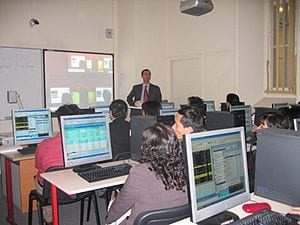
Nothing has more potential to lift more people out of poverty
LORD knows there’s a lot of bad news in the world today to get you down, but there is one big thing happening that leaves me incredibly hopeful about the future, and that is the budding revolution in global online higher education. Nothing has more potential to lift more people out of poverty — by providing them an affordable education to get a job or improve in the job they have. Nothing has more potential to unlock a billion more brains to solve the world’s biggest problems. And nothing has more potential to enable us to reimagine higher education than the massive open online course, or MOOC, platforms that are being developed by the likes of Stanford and the Massachusetts Institute of Technology and companies like Coursera and Udacity.
Last May I wrote about Coursera — co-founded by the Stanford computer scientists Daphne Koller and Andrew Ng — just after it opened. Two weeks ago, I went back out to Palo Alto to check in on them. When I visited last May, about 300,000 people were taking 38 courses taught by Stanford professors and a few other elite universities. Today, they have 2.4 million students, taking 214 courses from 33 universities, including eight international ones.
Anant Agarwal, the former director of M.I.T.’s artificial intelligence lab, is now president of edX, a nonprofit MOOC that M.I.T. and Harvard are jointly building. Agarwal told me that since May, some 155,000 students from around the world have taken edX’s first course: an M.I.T. intro class on circuits. “That is greater than the total number of M.I.T. alumni in its 150-year history,” he said.
Yes, only a small percentage complete all the work, and even they still tend to be from the middle and upper classes of their societies, but I am convinced that within five years these platforms will reach a much broader demographic. Imagine how this might change U.S. foreign aid. For relatively little money, the U.S. could rent space in an Egyptian village, install two dozen computers and high-speed satellite Internet access, hire a local teacher as a facilitator, and invite in any Egyptian who wanted to take online courses with the best professors in the world, subtitled in Arabic.
YOU just have to hear the stories told by the pioneers in this industry to appreciate its revolutionary potential. One of Koller’s favorites is about “Daniel,” a 17-year-old with autism who communicates mainly by computer. He took an online modern poetry class from Penn. He and his parents wrote that the combination of rigorous academic curriculum, which requires Daniel to stay on task, and the online learning system that does not strain his social skills, attention deficits or force him to look anyone in the eye, enable him to better manage his autism. Koller shared a letter from Daniel, in which he wrote: “Please tell Coursera and Penn my story. I am a 17-year-old boy emerging from autism. I can’t yet sit still in a classroom so [your course] was my first real course ever. During the course, I had to keep pace with the class, which is unheard-of in special ed. Now I know I can benefit from having to work hard and enjoy being in sync with the world.”
via The New York Times – THOMAS L. FRIEDMAN
The Latest Streaming News: Revolution Hits the Universities updated minute-by-minute
Bookmark this page and come back often
Latest NEWS
Latest VIDEO







